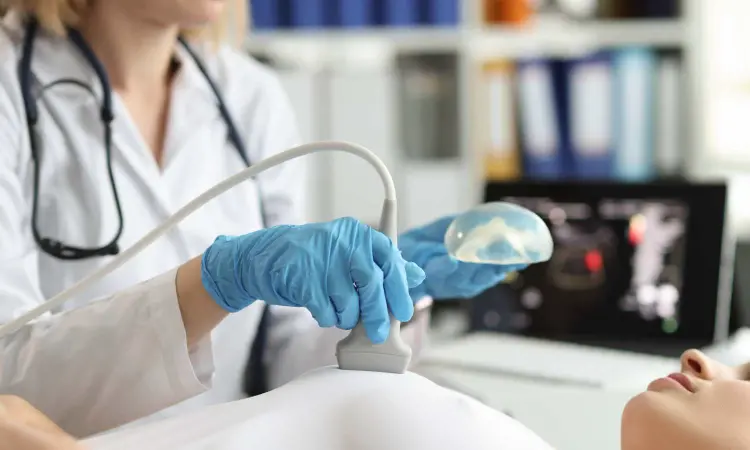- Home
- Medical news & Guidelines
- Anesthesiology
- Cardiology and CTVS
- Critical Care
- Dentistry
- Dermatology
- Diabetes and Endocrinology
- ENT
- Gastroenterology
- Medicine
- Nephrology
- Neurology
- Obstretics-Gynaecology
- Oncology
- Ophthalmology
- Orthopaedics
- Pediatrics-Neonatology
- Psychiatry
- Pulmonology
- Radiology
- Surgery
- Urology
- Laboratory Medicine
- Diet
- Nursing
- Paramedical
- Physiotherapy
- Health news
- Fact Check
- Bone Health Fact Check
- Brain Health Fact Check
- Cancer Related Fact Check
- Child Care Fact Check
- Dental and oral health fact check
- Diabetes and metabolic health fact check
- Diet and Nutrition Fact Check
- Eye and ENT Care Fact Check
- Fitness fact check
- Gut health fact check
- Heart health fact check
- Kidney health fact check
- Medical education fact check
- Men's health fact check
- Respiratory fact check
- Skin and hair care fact check
- Vaccine and Immunization fact check
- Women's health fact check
- AYUSH
- State News
- Andaman and Nicobar Islands
- Andhra Pradesh
- Arunachal Pradesh
- Assam
- Bihar
- Chandigarh
- Chattisgarh
- Dadra and Nagar Haveli
- Daman and Diu
- Delhi
- Goa
- Gujarat
- Haryana
- Himachal Pradesh
- Jammu & Kashmir
- Jharkhand
- Karnataka
- Kerala
- Ladakh
- Lakshadweep
- Madhya Pradesh
- Maharashtra
- Manipur
- Meghalaya
- Mizoram
- Nagaland
- Odisha
- Puducherry
- Punjab
- Rajasthan
- Sikkim
- Tamil Nadu
- Telangana
- Tripura
- Uttar Pradesh
- Uttrakhand
- West Bengal
- Medical Education
- Industry
Abbreviated MRI and Contrast Mammography Outperform Ultrasound in Detecting Breast Cancer in Dense Breasts: Study

UK: UK researchers have found in a randomized trial that supplementary imaging techniques, such as abbreviated MRI and contrast-enhanced mammography, detected more breast cancers than automated whole-breast ultrasound (ABUS) in women with dense breasts and normal mammograms. These techniques also identified invasive tumors at half the size compared to those found using ultrasound. However, their improved detection came with the drawback of higher recall rates.
The findings stem from the interim analysis of the Breast Screening – Risk Adaptive Imaging for Density (BRAID) randomized controlled trial, published in The Lancet, led by Prof Fiona J Gilbert from the Department of Radiology, University of Cambridge.
The trial, conducted across ten breast screening sites in the UK, aimed to evaluate the most effective supplemental imaging method for women aged 50–70 who had dense breasts and no abnormalities on routine mammography. Participants were randomly assigned to receive abbreviated MRI, ABUS, contrast-enhanced mammography, or continue with standard digital mammography, depending on the availability of each technique at the site.
Between October 2019 and March 2024, 9,361 women were recruited. Of these, 6,305 underwent additional imaging — 2,130 received abbreviated MRI, 2,141 underwent ABUS, and 2,035 had contrast-enhanced mammography. The primary goal was to assess the cancer detection rate confirmed through biopsy.
The key findings were as follows:
- Abbreviated MRI detected 17.4 breast cancers per 1,000 examinations.
- Contrast-enhanced mammography identified 19.2 cancers per 1,000 examinations.
- Automated whole-breast ultrasound (ABUS) detected 4.2 cancers per 1,000 examinations.
- Invasive cancers comprised 15.0 per 1,000 for abbreviated MRI, 15.7 per 1,000 for contrast-enhanced mammography, and 4.2 per 1,000 for ABUS.
- Invasive tumors detected using contrast-based methods were significantly smaller than those identified by ABUS.
- Contrast-based imaging techniques had higher recall rates, resulting in more follow-up procedures and potential patient anxiety.
- Adverse events were uncommon but occurred mainly in the contrast-enhanced mammography group, with 24 contrast-related reactions and three cases of extravasation reported.
According to the authors, the BRAID trial is the first of its kind to directly compare these three supplemental imaging modalities in a randomized setting. The evidence suggests that abbreviated MRI and contrast-enhanced mammography may enhance early detection efforts in women with dense breasts, a group for whom conventional mammography often falls short.
While the findings show promise for incorporating these techniques into breast cancer screening programs, the authors emphasize that further research is needed to determine the long-term benefits and possible harms, including overdiagnosis.
"Abbreviated MRI and contrast-enhanced mammography found three times more invasive cancers than ABUS, and the tumors were about half the size," the authors wrote, adding, "These results suggest that extra imaging can help catch cancer earlier in women with dense breasts, though the risk of overdiagnosis is still unclear."
Reference:
Gilbert, F. J., et al. (2025). Comparison of supplemental breast cancer imaging techniques—interim results from the BRAID randomised controlled trial. The Lancet. doi.org/10.1016/S0140-6736(25)00582-3.
Dr Kamal Kant Kohli-MBBS, DTCD- a chest specialist with more than 30 years of practice and a flair for writing clinical articles, Dr Kamal Kant Kohli joined Medical Dialogues as a Chief Editor of Medical News. Besides writing articles, as an editor, he proofreads and verifies all the medical content published on Medical Dialogues including those coming from journals, studies,medical conferences,guidelines etc. Email: drkohli@medicaldialogues.in. Contact no. 011-43720751


